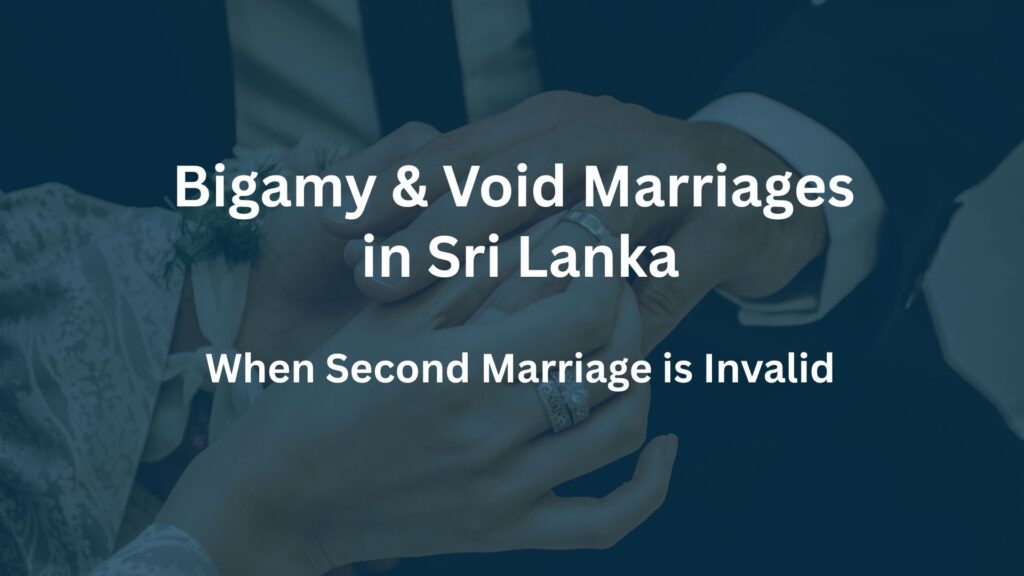An Analysis of SC Appeal No. 211/2012: Bigamy & Void Marriages. The Integrity of Matrimonial Law.
Case Title: Udagepolage Gunasiri Seneviratne vs Pattiya Widanage Carmen Premalatha
Court : Supreme Court of Sri Lanka | SC APPEAL 211/2012
Before: Priyasath Dep P.C., J., Priyantha Jayawardena P.C., J & Anil Gooneratne J.
Introduction
The decision of the Supreme Court of Sri Lanka in SC APPEAL 211/2012 decided on 02.05.2016, offers a striking reminder that a marriage, while deeply personal and social in nature, is fundamentally a legal institution – one whose validity depends not on emotions or appearances but on clear statutory compliance.
At the heart of this case is a single question:
Can a marriage be considered legally valid if one of the parties was already married to someone else at the time of contracting it?
In this judgment, the Supreme Court ultimately held that the marriage between the Plaintiff, Udagepolage Gunasiri Seneviratne, and the Defendant, Pattiya Widanage Carmen Premalatha, was null and void ab initio— a legal fiction from the outset – due to the Defendant’s existing, undissolved marriage to another man.
Procedural Background
The case originated in the District Court of Negombo, where the Plaintiff sought a declaration under Section 607 of the Civil Procedure Code and Section 18 of the Marriages (General) Ordinance No. 19 of 1907, asserting that his marriage to the Defendant was void from the beginning.
The District Court found in his favor. However, the High Court of Gampaha later reversed that judgment, prompting the Plaintiff to appeal to the Supreme Court, which granted leave to appeal on two key questions of law.
The Legal Framework – Bigamy & Void Marriages
Section 18 of the Marriages (General) Ordinance No. 19 of 1907:
“No marriage shall be valid where either of the parties thereto shall have contracted a prior marriage which shall not have been legally dissolved or declared void.”
Section 607 of the Civil Procedure Code:
(1) “Any husband or wife may present a plaint to the District Court… praying that his or her marriage may be declared null and void.”
(2) “Such decree may be made on any ground which renders the marriage contract between the parties void by the law applicable to Sri Lanka.”
The Factual Matrix
The Plaintiff and Defendant were married in October 1992. The Plaintiff later discovered that the Defendant had previously entered into two other marriages: to Jeinul Abdeen Mohamed Ishak (1977) and to Rathnayake Mudiyanselage Gnanasena (1985).
The Defendant had obtained a divorce from Ishak in 1983, but never annulled or dissolved her second marriage with Gnanasena. This non-disclosure led the Plaintiff to seek judicial intervention to declare their marriage void.
Was the Second Marriage Valid?
The Defendant argued her marriage to Gnanasena was void as he was already married to another woman. The Court rejected this, emphasizing that even if the prior marriage was void, a court declaration was necessary.
Justice Gooneratne noted: “This position is untenable in law… Respondent’s position… is an abuse of the process of law.”
Fraud and Misrepresentation
The Supreme Court held that the Plaintiff had been misled, noting the Defendant had not disclosed her prior marriage at the time of their wedding.
This lack of transparency was crucial in the Court’s reasoning.
Legal Capacity and Sanctity of Marriage
The Court emphasized: “A marriage is valid only if one of the contracting parties or both have not entered into a previous marriage… If not the contract of marriage would be invalid.”
It reaffirmed that legal capacity is a non-negotiable prerequisite for marriage.
Void Marriages and Legal Maxims
Drawing from English legal texts, the Court explained distinctions between void and voidable marriages, and cited legal maxims:
“No man can take advantage of his own wrong.”
“A man cannot both affirm and disaffirm the same transaction.”
Final Judgment
The Court set aside the High Court’s ruling and reinstated the District Court’s judgment, holding the marriage null and void.
It answered the questions of law in favor of the Plaintiff and clarified the need for court-declared nullity before remarriage.
Conclusion
This judgment is a firm reiteration that statutory compliance is foundational in marriage law. It also underscores the judiciary’s role in protecting the institution of marriage from abuse, deceit, and informal assumptions.
The decision in SC APPEAL 211/2012 reinforces the legal structures that uphold matrimonial legitimacy in Sri Lanka.
Author: Mr. Haris Palpola
Original Article
